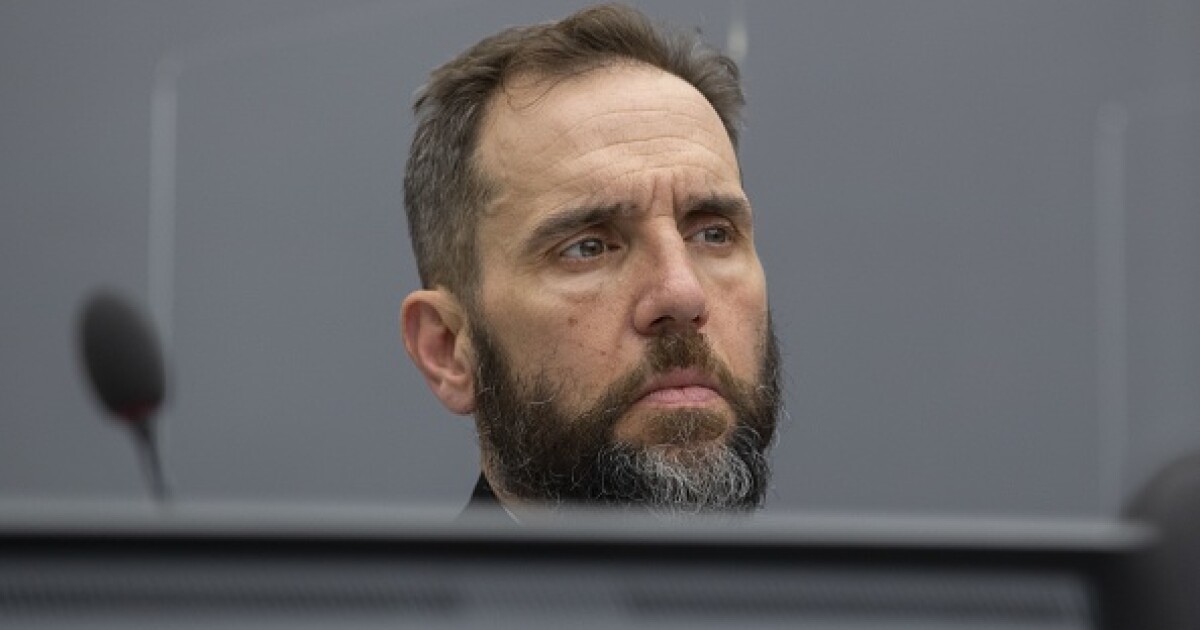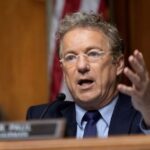

Former President Donald Trump’s latest legal entanglement has all the hallmarks of a drama: charges of espionage, cries of political persecution, intrigue over sensitive government secrets, and warring factions of high-powered lawyers.
The infighting on Trump’s defense team has left him searching for new attorneys able to fight his case in Florida, where the Justice Department last week hit him with 37 counts of criminal misconduct related to his handling of classified documents.
DONALD TRUMP ARRESTED: WHAT A DISPUTE OVER MAR-A-LAGO RAID COULD MEAN FOR FORMER PRESIDENT’S DEFENSE
The lawyers who remain, as well as some who have left Trump’s service, have also pointed fingers at Justice Department officials who they say engaged in unethical behavior to secure charges against Trump.
Here is our guide to the players in the Trump legal drama.
TODD BLANCHE
At Trump’s side in a Miami courthouse on Tuesday, white-collar defense attorney Blanche entered the former president’s not-guilty plea.
Blanche joined Trump’s defense team in April to help him fight an indictment in a different case: an alleged violation of campaign finance laws related to hush money payments he sent during the 2016 campaign. The Manhattan district attorney, an elected Democrat, brought those charges against Trump.
A former prosecutor himself, Blanche connected with Trump’s camp by defending Paul Manafort, Trump’s former campaign chair, against charges of mortgage fraud and other misconduct in New York in 2019. He successfully had the state charges against Manafort thrown out by claiming double jeopardy, as Manafort had faced federal charges for the same activity.
Blanche also represents Boris Epshteyn, a longtime Trump adviser and a current member of the legal team, and did so before joining Trump’s defense himself.
M. EVAN CORCORAN
Federal prosecutors built much of their case off the notes of one of Trump’s lawyers by convincing a judge that Trump and Corcoran no longer had a right to the protections of attorney-client privilege.
Corcoran was ordered to testify before a grand jury in March after the court ruled in favor of prosecutors who sought to invoke the crime-fraud exception, which states that a client’s communications with his or her attorney are no longer off-limits if the client tries to enlist an attorney in criminal activity.
Corcoran, still one of Trump’s attorneys despite recusing himself from the documents case, had taken notes on questions Trump asked about how to handle a subpoena demanding the return of documents, such as what would happen if Trump did not respond at all or why Hillary Clinton’s lawyer was permitted to destroy 30,000 emails he had deemed private without first allowing the government to verify that.
The prosecution argued that such questions, as well as other interactions between Trump and Corcoran that Corcoran memorialized in notes, represented an attempt by Trump to rope his lawyer into an obstruction plot.
Some legal experts, as well as current and former members of Trump’s defense, have argued that prosecutors had no legitimate basis for piercing attorney-client privilege, and Trump’s team is likely to work to get Corcoran’s notes thrown out of evidence.
STANLEY WOODWARD
The attorney for Trump’s co-defendant, Walt Nauta, has leveled an allegation of serious misconduct against a top Justice Department official that could become central to Trump’s defense.
Woodward said in a court filing that Jay Bratt, a top Justice Department official with a leading role in the documents investigation, mentioned during an interview that he knew Woodward had applied for a superior court judgeship in Washington, D.C. In his filing, Woodward said he interpreted the comments in context as a threat to his career prospects if he did not get his client, Nauta, to cooperate with prosecutors.
Trump’s team has already begun highlighting the exchange between Woodward and Bratt as a key example of the type of prosecutorial misconduct they plan to allege in their defense.
STEVEN D’ANTUONO
The assistant director of the FBI’s Washington field office at the time of the August 2022 raid at Mar-a-Largo, D’Antuono supplied potentially key testimony last week to the House Judiciary Committee about the Justice Department’s push to execute a search warrant.
D’Antuono told the committee that he had proposed seeking Trump’s consent to search the property first, confident the former president would have allowed it. Trump himself said after the raid that the move was unnecessary because his lawyers had been cooperating with the Justice Department for months.
Indeed, Trump’s attorneys had invited Bratt and other Justice Department officials to the home just weeks earlier and had even voluntarily shown Bratt the storage room that FBI agents would later break into as part of the raid.
D’Antuono has since left the FBI for the private sector. But his testimony could factor into a defense narrative that paints the Justice Department as needlessly aggressive in the Trump case while following standard protocol in similar ones. President Joe Biden, for example, was permitted to have his lawyers conduct multiple searches on their own without having to swear they had found all classified material; when the FBI did search Biden’s houses, they did so with Biden’s knowledge and permission.
Still, defenders of the Justice Department say back-and-forth debates between Justice Department officials and FBI field agents over how to advance investigations are common in many cases and that D’Antuono’s observations don’t necessarily reveal unethical conduct.
CHRISTINA BOBB
A former host for One America News Network, Bobb landed at the center of the classified documents battle when, last summer, she signed her name to a statement swearing a “diligent search” of Mar-a-Lago had been conducted and all remaining classified materials had been returned to the government.
When the FBI raided Mar-a-Lago weeks later and found at least 100 additional classified documents, her signature on the statement became a potential liability, both for her and for Trump. She was working at the time as an attorney and aide to the former president.
Bobb reportedly faced scrutiny from the Justice Department and spoke with investigators last year as they looked into whether she knowingly lied in the sworn statement in June 2022.
For her part, Bobb told investigators that Corcoran drafted the statement, told her the search had been conducted, and asked her to sign it. She said she signed it based on the information provided to her by Corcoran and reportedly requested that a disclaimer be added to the document to reflect that she was swearing the statement to be true “to the best of my knowledge.”
Neither Bobb nor Corcoran has faced charges over the false confirmation that all documents had been returned.
But the contradiction between that statement and what FBI agents found when they searched Mar-a-Lago laid the groundwork for the Justice Department to focus on obstruction charges, in addition to the document retention offenses.
JAY BRATT
Bratt’s role in the special counsel’s investigation is likely to come under scrutiny for several reasons.
First, Woodward, the lawyer for Trump’s co-defendant, has accused him of using threats to pressure Woodward into getting his client to cooperate with prosecutors.
Second, D’Antuono, the former FBI official, has testified to the House Judiciary Committee that the Justice Department broke from standard procedure by allowing Bratt to oversee the initial part of the investigation rather than assigning it to a U.S. attorney.
D’Antuono said he never received a satisfactory answer as to why the Justice Department did not want to involve a U.S. attorney in the investigation and instead wanted Bratt in charge.
Bratt was among the handful of FBI and Justice Department officials who traveled to Mar-a-Lago in June 2022 to pick up what Trump’s lawyers said were the last of the classified documents in their possession.
During that visit, Corcoran showed Bratt the storage room where the classified documents had been kept. Later, Bratt emailed Corcoran to suggest a heavier lock for the room. Trump’s defenders have cited that exchange as a reason why the former president’s team felt blindsided by the raid two months later given that they believed they were working well with the Justice Department.
Why Justice Department officials, under Bratt’s supervision, began to suspect that classified material remained at Mar-a-Lago remains unclear. Much of the affidavit supporting the search warrant that preceded the raid is still redacted.
At some point, however, the Justice Department issued a subpoena for surveillance footage from Mar-a-Lago that reportedly showed people moving boxes in and out of the unsecure area where classified material had been kept. The Trump team handed that footage over in July 2022, roughly a month after Bratt’s visit.
BORIS EPSHTEYN
A longtime political adviser, Epshteyn’s work on the Trump legal team has caused fissures among the current and former attorneys.
At least one, Tim Palatore, has said publicly that he left the team because Epshteyn’s advice made it difficult to convince Trump to take a more cautious approach.
Epshteyn’s continued involvement has made it difficult for Trump to find Florida defense attorneys willing to help him fight the federal indictment, a person familiar with the discussions told the Washington Examiner this week.
Known for his loyalty to the former president, Epshteyn is said to have painted a far rosier picture of the investigation than more seasoned lawyers believed was accurate.
Epshteyn was one of the few lawyers in the room when Trump made his first court appearance in the Manhattan hush money case in April, alongside Blanche, Susan Necheles, and Joe Tacopina, three other Trump lawyers.
Tacopina represented Trump in the federal civil lawsuit he recently fought, and lost, against a woman who claimed he had sexually abused her years ago.
JACK SMITH
Attorney General Merrick Garland appointed Smith in November to take over the classified documents case to, he said at the time, preserve the independence of the investigation.
Skeptics of the choice of Smith point to the case of former Virginia Gov. Bob McDonnell, a Republican, who in 2014 was convicted on corruption charges after an investigation by the Justice Department’s Public Integrity Section, which Smith oversaw at the time.
The Supreme Court unanimously threw out the conviction in 2016, ruling that prosecutors had moved far too aggressively and relied upon a “boundless” definition of what constituted illegal activity to build their case.
Smith’s reputation as a sometimes overly zealous prosecutor is back in the spotlight given his decision to move forward with a broad interpretation of the Espionage Act to bring charges during an election in such a highly sensitive case.
Thirty-one of the 37 counts Trump faces in his indictment are charges under the Espionage Act, but Smith is not arguing that Trump violated the part of the law that deals with an active attempt to harm the United States or share classified information with a foreign power.
Instead, Smith appears to be arguing that the mishandling and withholding of documents was in itself the harm to the U.S. government under the Espionage Act, a potentially dubious application of the law, wrote Jonathan Turley, George Washington University law professor.
CLICK HERE TO READ MORE FROM THE WASHINGTON EXAMINER
Professional peers have described Smith to various news outlets as a dogged investigator who pursues cases aggressively.
“If the case is prosecutable, he will do it,” a former colleague of Smith’s from a U.S. attorney’s office told Reuters.





